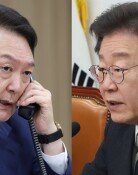[Editorial] Personnel Is What Matters In Diplomacy and National Security
[Editorial] Personnel Is What Matters In Diplomacy and National Security
Posted June. 07, 2005 06:29,
The appointment of a successor for National Intelligence Service (NIS) Director Ko Young-koo, who tendered his resignation, is being delayed. It was reported that the Cheong Wa Dae is in the middle of the final verification process regarding three candidates. It is expected that a part of the diplomacy and security team will also be changed according to the selection result. I hope that the team will be made up of those whom the people can trust and feel confidence in to resolve the urgent North Korea nuclear crisis and safeguard the future of the Korea-U.S. alliance. Personnel is the ultimate issue in diplomacy and security, too.
We judge that the hub of diplomacy and security, the Korea-U.S. alliance, has not been smooth since the inauguration of the current regime because of inappropriate appointments. We could have drastically reduced conflict and friction if the president appointed those who could read world situations correctly and manage the Korea-U.S. alliance with a practical mind, regardless of their intimacy or ideological homogeneity with the president.
The indications are proper that the appointment of those who cannot be reputed as being well informed of the international situation, considering their usual field of interest to manage relevant information and intelligence, nurtured distrust. Even if it is true that the image of the NIS was ameliorated from appointing a human rights lawyer to direct the institution, then we had to suffer from such comments as, "[Japan] does not want to share information with Korea because it is not trustworthy."
It is also true that a scholar, who had studied only North Korea for his life, was appointed to the head of the National Security Council (NSC) overnight and caused the Korea-U.S. alliance to weaken by offering half-baked ideas such as "cooperative independent national defense" and "Northeast Asian balancer."
We should take this opportunity to conduct an all-out consolidation of the diplomacy and security system in which the NSC is playing a central role. It is doubtlessly wrong that the NSC, which should restrict itself to harmonizing policies among the Foreign, Defense, and Unification ministries as a presidential consultative body, reigns over these posts and even implements specific policies.
What is truly important, however, is personnel. The president should find and appoint those who are not ideologically biased and have expertise so that they can maintain and practice the principle of prioritizing national interests in whatever circumstances. The president should never trust anybody with national security matters if they have even the slightest possibility of having been affected by emotional independence ideology and anachronistic anti-Americanism.







